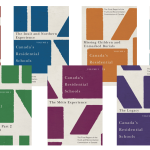In December 2015, the Truth and Reconciliation Commission of Canada shared its final report—the culmination of over 6 years of work to document the truth of the Indian Residential School System in Canada. The final report is nearly 3800 pages and references the 5.5 Million documents collected and almost 7000 testimonies given by survivors from across the country.
As an intergenerational survivor of residential schools, the end of the TRC is bittersweet. Their work in collecting, documenting, and sharing this story with Canadians was a tremendous effort but the truth sharing is just beginning.
How will we continue to understand this history and how it manifests itself in society today? More importantly, how are we going to battle this systemic racism?
How we will honour the stories shared by survivors to make sure that the generations to come understand period in Canada’s history?
How will we live reconciliation in our words and actions to repair hundreds of years of damaged relationships?
As Justice Murray Sinclair, Chair of the Truth and Reconciliation Commission of Canada said, “As commissioners, we have described for you a mountain. We have shown you the path to the top. We call upon you to do the climbing.” I have hope that Canadians are ready to take on this challenge. The TRC outlined this path in the Executive Summary released earlier this year through the 94 Calls to Action.
The challenge I issue to all Edmontonians and Canadians: Read the TRC Report. If seven volumes and 2.3 Million words is overwhelming, start with the Calls to Action. These are tangible actions that governments, businesses, and organizations can implement and individuals can advocate for. Once you’ve finished that, read the Executive Summary or listen to hundreds of Canadians read it to you via YouTube. The report is available for free online, in printed form, and the entire report will soon be available at your local library. And on February 10th, you can join others in person at the Prince of Wales Armouries Heritage Centre at a Reading Club specifically designed to tackle the reading of the full TRC report in 2016, hosted by RISE – Reconciliation in Solidarity Edmonton in partnership with EHC. This is an essential read for every person living in Canada to understand the truth about this 150-year period in our collective history. Every Canadian is affected and every Canadian should learn this shared truth.
In the coming months, the Edmonton Heritage Council board and staff will be looking at the findings of the TRC more closely to see how the final report will effect the work we do. Many of the Calls to Action directly influence our role in sharing Edmonton’s story and will impact the heritage sector as a whole. In 2016, the EHC will be focusing on broadening our reach to help tell the stories of the many cultural communities that make up our city. This work will start in the coming months with our Community Conversations series and continue with a research symposium on the Charles Camsell Indian Hospital later in the spring.
True reconciliation for all Canadians will come when our society is based in mutual respect and understanding of each other. It starts with education and will prove itself in the way we speak to and about one another. A mountain lies ahead for us all and the journey to reconciliation will be a long, challenging climb. We’ve already started the work but we need to keep at it, one step forward at a time and helping each other along the way. I look forward to meeting you all on the mountain path.
- The seven volumes of the Final Report of the Truth & Reconciliation Commission
